#but its hilarious because then like. middle schoolers have my art in their room and they have no idea its silent hill
Text

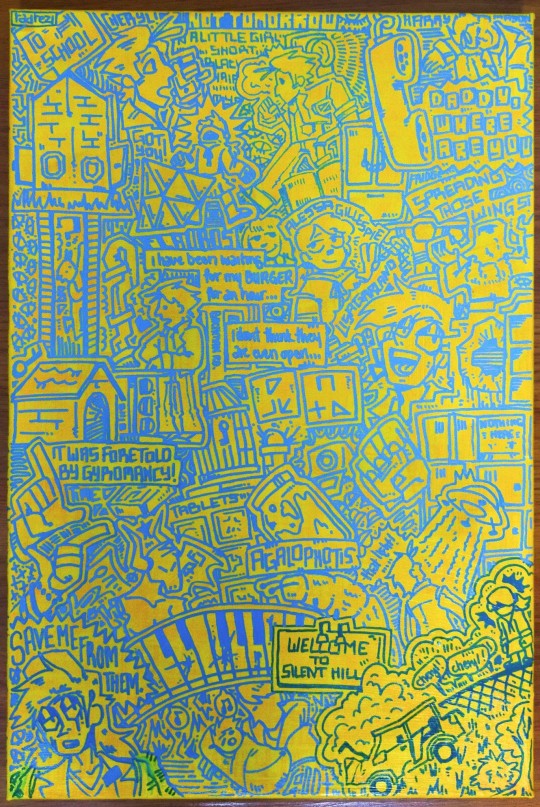

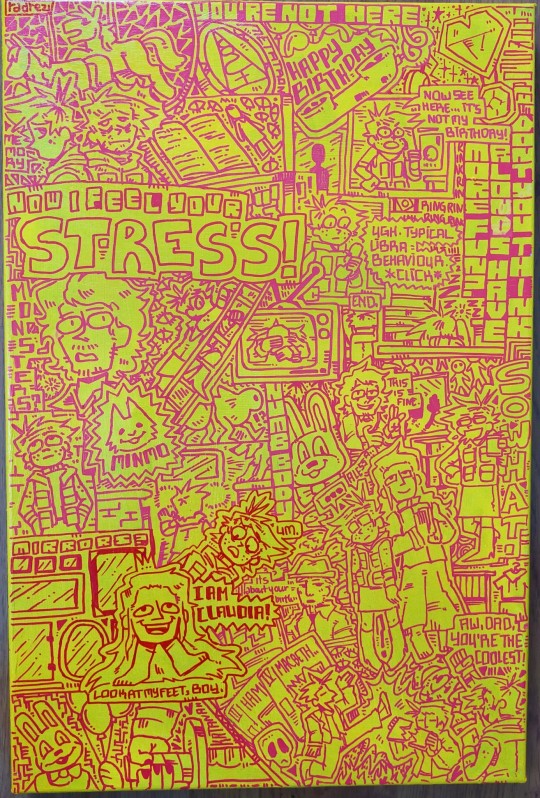
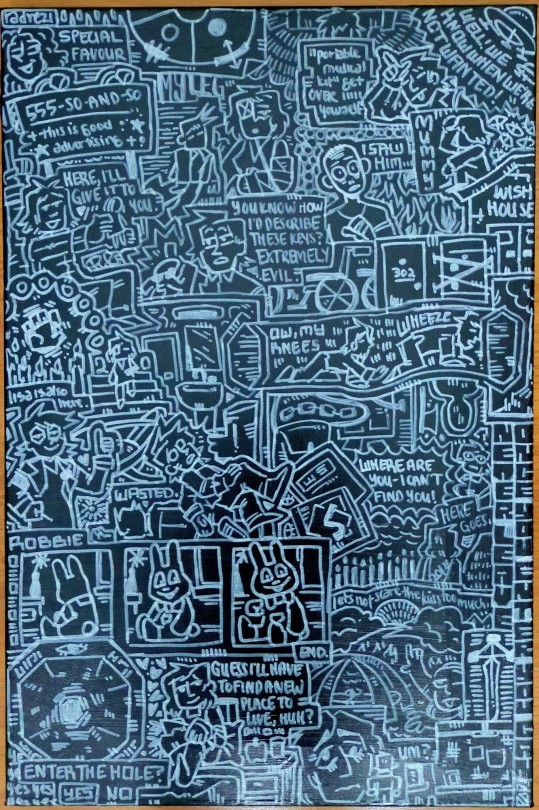

canvases based on the first four silent hill games :-) zoom in for detail!
#silent hill#silent hill fanart#silent hill 3#silent hill 2#silent hill 4#my blue marker was not cooperating#you can tell the only game ive played recently is sh2#also i sell these to korean catholic mums so i have to can the gore and the weapons#but its hilarious because then like. middle schoolers have my art in their room and they have no idea its silent hill#oh and lisa is in all of them. obviously. harry too but thats just a coincidence he just happened to appar#appear#anyway had these in my camera roll for like a week but was undecided on whether to post them because //waves my hands#but you guys have. suffered enough from following me this week so here?#tag of torture
945 notes
·
View notes
Text
this summer, me and my brother watched four whole shows. at long last, here is my comprehensive review of all of them!
in the order we watched them, these shows were:
avatar the last airbender (ATLA)
mob psycho 100 (MP100)
demon slayer / kimetsu no yaiba (KNY)
fullmetal alchemist: brotherhood (FMAB)
they were all very very good!
i’m not going to try to rank them, but, as is probably obvious by the state of my blog, my favorite was FMAB :) if i had to pick a least favorite, then, it would probably be KNY—not by any fault of its own, but just because it didn’t appeal to me quite as much as the others. still a very good show!
i will review each show by:
giving a quick plot-based pitch discussing the show’s hook or appeal
discussing one element that i believe it does better than any other show on this list—in other words, a quality that i think it stands out for
discussing one element that didn’t appeal to me or that i had issues with—a criticism
putting forth my favorite character and favorite episode or arc, just for funsies
including various other commentary. mostly positive, as, again, i did really like all of these!
(i’ve tried to make this whole thing free of specific spoilers, but if you’re planning on watching any of these shows and want to go in more-or-less blind, it might be best not to read this.)
first of all, i’d just like to discuss all four of these shows as a whole! it was definitely interesting watching one after another and noting similarities between them.
all of them have siblings in them! which is, perhaps, fitting, as i watched them with my brother
two include a pair of siblings in which one has powers and one doesn’t (at least at first), and part of the narrative involves getting better at using those powers (ATLA, MP100)
two include a narrative centered around a pair of siblings and something tragic that happens to them, resulting in the older one being traumatized and forced to train to become a soldier, and the younger one turning into something (arguably) inhuman. the protagonist’s major goal is to return his younger sibling to the way they were before (KNY, FMAB)
ATLA and FMAB are both fantasy political dramas, which is rapidly becoming a favorite genre of mine
most of these are historical, or historically inspired in some way, which is interesting!
all of these shows are really really good at character building. all the main characters are interesting and complex, and the relationships between those characters are similarly nuanced and very well written. they make you really care about both the protagonists and the side characters!
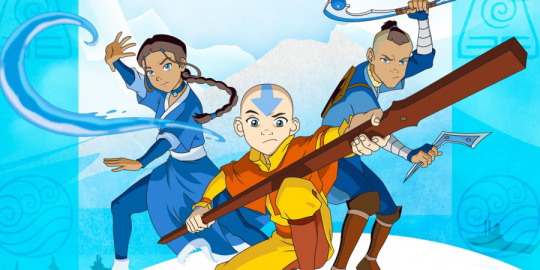
avatar: the last airbender
pitch: as the ever-growing imperial force of the fire nation threatens the earth and water nations, a kid from the long-lost air nation turns up and it turns out he can control all four elements and he has to save the world and all that. sorry i tried to write this pitch like five times and realized that well at this point i think everyone reading this will know the plot of avatar
stands out for: avatar has possibly the best worldbuilding i have ever seen in a show—it takes the time to introduce us to so many places and aspects of its world, both explicitly and subtly. the main highlight of this is the magic system. by creating a magic system based in body movement, the process of using magic and learning to use/control it better becomes immediately obvious to the viewer. combine that with the philosophy behind each type of bending and the way that characters take bending inspiration from types different than their own, and you’ve got a system that is complex, flexible, believable, internally consistent, and just plain fun! it makes action sequences a blast. i especially liked the moments when bending was stretched to its limits in totally logical ways (metalbending, bloodbending). not to mention the way that bending is seamlessly integrated into the world of avatar! the example that comes to mind is the earthbending-powered transport system of omashu. a whole essay could be written on that topic alone!
criticism: i know this is a sentiment shared by many people, but the first season was kind of boring to me. some of the humor and the plots felt hit-or-miss. of course, it needed to take that time to establish the world, and it does a great job of doing that. it just didn’t hook me until the second season.
favorite character: i love toph she’s so much fun :) iroh is a close second! and zuko is great, too, of course
favorite arc: i loved ba sing se a ton, especially the episode when they get there and everything feels off. it felt so resonant with real life, in a very fun way. there’s a reason “there is no war in ba sing se” is a meme…
other commentary: what can i say? it’s a classic for a damn good reason. the plot is tight, and it does a great job raising tension and introducing new elements and twists. i also love the care put into the antagonists, especially azula, who has a fascinating arc.
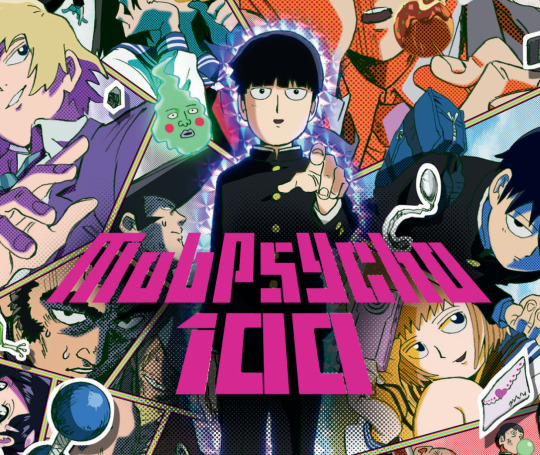
mob psycho 100
pitch: a middle schooler and a charismatic con artist team up to smite ghosts using extrasensory powers. thing is, only the middle schooler actually has ESP, and it happens to be really, really powerful. can he navigate the difficult world of middle school while also getting a better grip on his powers—and his bottled-up emotions?
stands out for: the way that MP100 uses animation is excellent. it takes a little getting used to but it’s just so fun, combining all sorts of different techniques to create an experience rich with drama and emotion. it’s playfully exaggerated and self-parodying, adding to the show’s fantastic sense of humor as well as its truly emotional moments.
criticism: the way that ESP works makes suspension of disbelief tricky. it’s a great feat to introduce a character who is essentially all-powerful and still make them interesting (even in fight scenes), but at times (especially the second season finale) it felt like a magic system with too much breadth and too few limitations. this might just be my bias for hard magic systems talking, though.
favorite character: other than mob and reigen? probably teru. he’s loads of fun AND all the season 1 episodes he’s in slap hard
favorite episode: the one where the girl asks mob out on a date as a dare.. it’s super cute
other commentary: thank you mp100 for being the leftist propaganda we all deserve <3
in all seriousness though, this show is a blast!! it does a great job switching between silly and serious in the blink of an eye. i also really appreciate the way that it balances comically huge stakes with much smaller, more personal stories. for example, the conflict between mob and reigen in season 2 is especially well-done. in general the emotions just feel so real? characters whose emotions tie into their powers are an excellent trope, and mob is a wonderful protagonist who exemplifies this really well.
finally, on a more critical note—there are so many characters in this show! and it feels like only a handful are fleshed out? however, this may be due to the fact that it’s not an adaptation of the entire manga (which i haven’t read). there’s a lot more to go! more characters to dive into! so i probably shouldn’t try to critique it in the same way as a finished work.
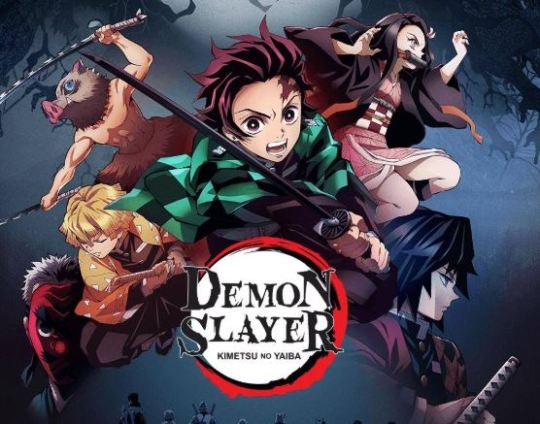
demon slayer / kimetsu no yaiba
pitch: demons kill a boy’s family and turn his sister into a demon, so he decides to try and figure out a way to turn his sister back into a human. what follows is a demon-killing adventure that’s in equal parts harrowing, poignant, and hilarious.
stands out for: there’s not much i can say about this other than “please just take a look” but the art and design is phenomenal. it does a much better job of integrating 2D and 3D than a lot of other animated series, and overall it is just so so pretty! all the character designs are complex, memorable, and fit the characters perfectly. the color choices are interesting and satisfying. i also really like the sound design? not often that i notice that in a show. i’ve watched so many KNY amvs by now lol it’s just amazing animation
criticism: the narration style leans too heavily towards tell instead of show. this is mostly an issue with the first few episodes, but i got super annoyed by how much the show would narrate every single one of tanjirou’s thoughts instead of letting us infer those thoughts through his actions and reactions—the latter, i think, would have been more emotionally impactful. sometimes silence speaks louder than words! tanjirou was also not the world’s most compelling protagonist in my opinion, though i think that mostly has to do with my own tastes.
favorite character: *holds up zenitsu* I Just Think He’s Neat. i actually kind of lost it when he first used his powers, like… damn i love characters with weird relationships with their magic like that. i also think the narrative about how having a solid foundation is sometimes more important than knowing a ton of different moves was really powerful. and he’s just funny! pathetic boy i love him
favorite arc: really just the whole spider arc. fucked up man… i love it. they pulled off that last twist so well, and all the family stuff was so weird and complex and emotional…
other commentary: it’s just a really solid and very well-written show! the team of tanjirou, zenitsu, and inosuke is so much fun… bro bonding :) i also quite like the horror elements; it’s fucked up but in a good way. finally, this is very specific, but the demon that can alter buildings/rooms through drumbeats? appealed to me very much. it’s a cool and unique power!
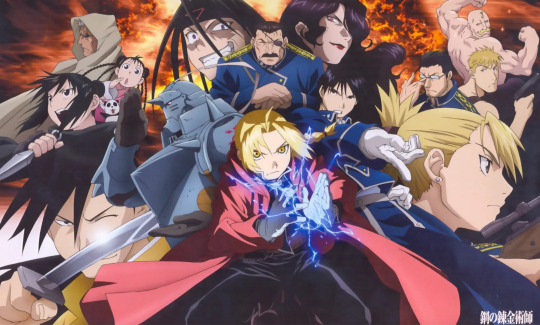
fullmetal alchemist: brotherhood
pitch: two kids do some fucked up alchemy and end up getting parts of their body stolen by god. now they’re on a quest to get their bodies back, but find themselves wrapped up in crazy government conspiracies and alchemy more powerful than they ever could’ve imagined…
stands out for: plot. by this i mean less overall concept (though the overall concept is pretty great too), and more that the pacing and progression of the story is extraordinarily tight. for the most part (the first few episodes are a little weak but i’ll let it slide), it does an excellent job establishing its premise and building on it logically, adding layers and layers that extend naturally from what we already know. everything has a reason for happening; everything is revealed in good time and all the twists are super satisfying. there’s great balance between exciting moments and quiet moments. it’s just very good at being a story!
(fun fact: i’m reading the manga right now and so far it’s even better paced than the show, which is super interesting! it’s especially good at how it lays out pieces of the backstory and then fills everything in later in a really satisfying way.)
criticism: this is incredibly specific but it’s what comes to mind as something that bothered me: winry’s character arc was really disappointing. for most of the series she’s a pretty strong character, but in the end it feels like she gets pushed aside, defined only by her relationship with ed. what happened to her wanting to take action more? that was a specific desire she expressed—wanting to be less passive! since she’s such an important character, i wish she could have had more presence in the last season other than as a sounding board for the elric bros’ emotions. (even though her one scene in the last episode was really good and emotional…)
favorite character: other than the elric bros, absolutely ling. he fits into multiple of my favorite character archetypes (fun, silly, bastard, gets possessed…) and he’s just overall a delight. plus his relationship with greed is really really good. bro bonding at its peak!! (my other favorite is pride. i will not say why because spoilers. but if you know me.. you know)
favorite episode: this is really really hard to choose but i’m gonna go with envy’s death because. holy shit.
other commentary: i’m a really big fan of the complex and nuanced way in which FMAB breaks down militaristic, imperial regimes from the inside. many of the characters have done awful things, and the story forces them to grapple with that and accept that all they can do now is be better in the future. the moral complexity is just really good! characters with flaws—we love to see it!
finally, parts of this story seem so so catered to Me Specifically that it’s no wonder i got so into it. like just the entire premise? the way that so much of the conflict is built out of identity crisis and exploring the nature of consciousness and human vs inhuman? beautiful. i love ed and al so much
*
if you made it all the way to the end, thank you so much for reading!! glad to have finally gotten this done (3 months late…) and put all my thoughts down. i hope this inspires someone to try watching one of the shows i discussed!
#avatar the last airbender#mob psycho 100#kimetsu no yaiba#fullmetal alchemist#my post#long post#then for my own tagging purposes..#atla#mp100#kny#fmab#i really hope some people read this! i put a lot of thought into it
14 notes
·
View notes
Text
This anime season is coming to a close so I guess it’s time for my final thoughts. I’m doing things a little differently this time and starting with my least favorites.
Disappointments
-Cardcaptor Sakura: Clear Card Arc makes me think of an episode of Community where some characters conduct a social experiment. They’re trying to see how long they can keep people waiting in a room before those people get fed up and leave. Clear Card Arc is the anime equivalent of that social experiment, especially since the reward for sticking with it to the end is absolutely nothing. The only positive is the episodes with Meiling, but otherwise this was a complete waste of time, especially if they don’t plan to animate another season (though I’m not in any rush to watch more unless they get their shit together tbh).
-I think I already mentioned dropping Kakuriyo for casually justifying a character being a literal slave owner, but in case I didn’t it’s worth mentioning because y i k e s.
-Amanchu was one of my favorites during its first season, so I was excited for more. This season, while very different from the first, was enjoyable. At least until they pulled the most horrific No Homo I’ve ever seen in my life. Basically, there was a character presented as a girl who liked macho things, and portrayed as a rival to Futaba for Pikari’s affections. But ~plot twist~ it turns out that character was a boy the whole time. And Futaba says something about his love for Pikari being “different from [her own]” because he’s a boy and lol girls can’t love girls ~that way~. Not to mention he’s a middle schooler while the girls are in high school. Because apparently that’s more acceptable than being a wlw. Uuuuuuugh.
(Gonna put the rest behind a cut because as usual this got longer than anticipated, haha)
Running Behind
-There’s a couple anime I didn’t exactly drop but haven’t finished yet either. Namely Legend of the Galactic Heroes: Die Nue These and Wotakoi. Galactic Heroes is good so far, but I have to be in the right mindset to watch it. It requires a lot of focus to follow what’s happening, at least for me. And with Wotakoi, while I loved the first episode, I’m still put off by Kabakura and his relationship with Hanako, so that’s been keeping me from watching it (that and the fact that the next episode after the last one I saw is a Christmas special and as a Jewish person I rarely care for those). I also still need to watch this season of My Hero Academia, though I already read that part in the manga and it’s some of my favorite material from the series to date.
Almost But Not Quite
-Golden Kamuy had a lot of great things going for it, particularly Asirpa and the respectful handling of Ainu culture in general. However, it wasn’t quite so considerate with queer characters, and I dropped it after hearing about the trans villain character (not that queer villains are inherently bad if they’re otherwise handled respectfully, but when there aren’t also queer heroes then it’s a problem).
-Gegege no Kitaro was quite often hit or miss. An episode about a stalker fell flat when it completely contradicted its own message at the end, and the kappa episode got really uncomfortable with the weird butt ball thing that kept repeating over and over and came across pretty rape-y (I eventually got fed up and didn’t finish the episode). Episode 7 (the one with the ghost train) was a standout though, and if you only watch one episode of this show make sure it’s that one.
Overall favorites
-Aggrestuko is hands down my favorite short anime series and also one of my favorites, period. Even the initial premise of it sounds like it was made for me as someone who is also a metalhead, haha. But it’s also consistently funny and relateable, has great lady friendships, and great characters in general (Gori is definitely my fave).
-Megalobox had consistently excellent writing, gorgeous art and animation, and strong character work. Even though the story itself was familiar, the execution was what made this series stand out as an example of how to make a great sports anime.
-Hinamatsuri was also hilarious from start to finish, though a lot of the content with Hitomi got uncomfortable at times, especially in episode 10. But Anzu is amazing and episode 6 made me cry, which is a testament to how well this show also handles more serious and emotional content.
-Yotsuiro Biyori is probably this season’s underrated gem. It’s a cute, chill show with lots of good food and also cats being adorable. It also has some great messages, like an episode where a macho guy wants to eat cute desserts at a cafe but is concerned about being the only guy there, and he’s encouraged to be himself and enjoy the desserts. The characters are also really endearing, and the comedy moments are well done (often based in being ridiculous and over-the-top, in a good way).
1 note
·
View note
Photo
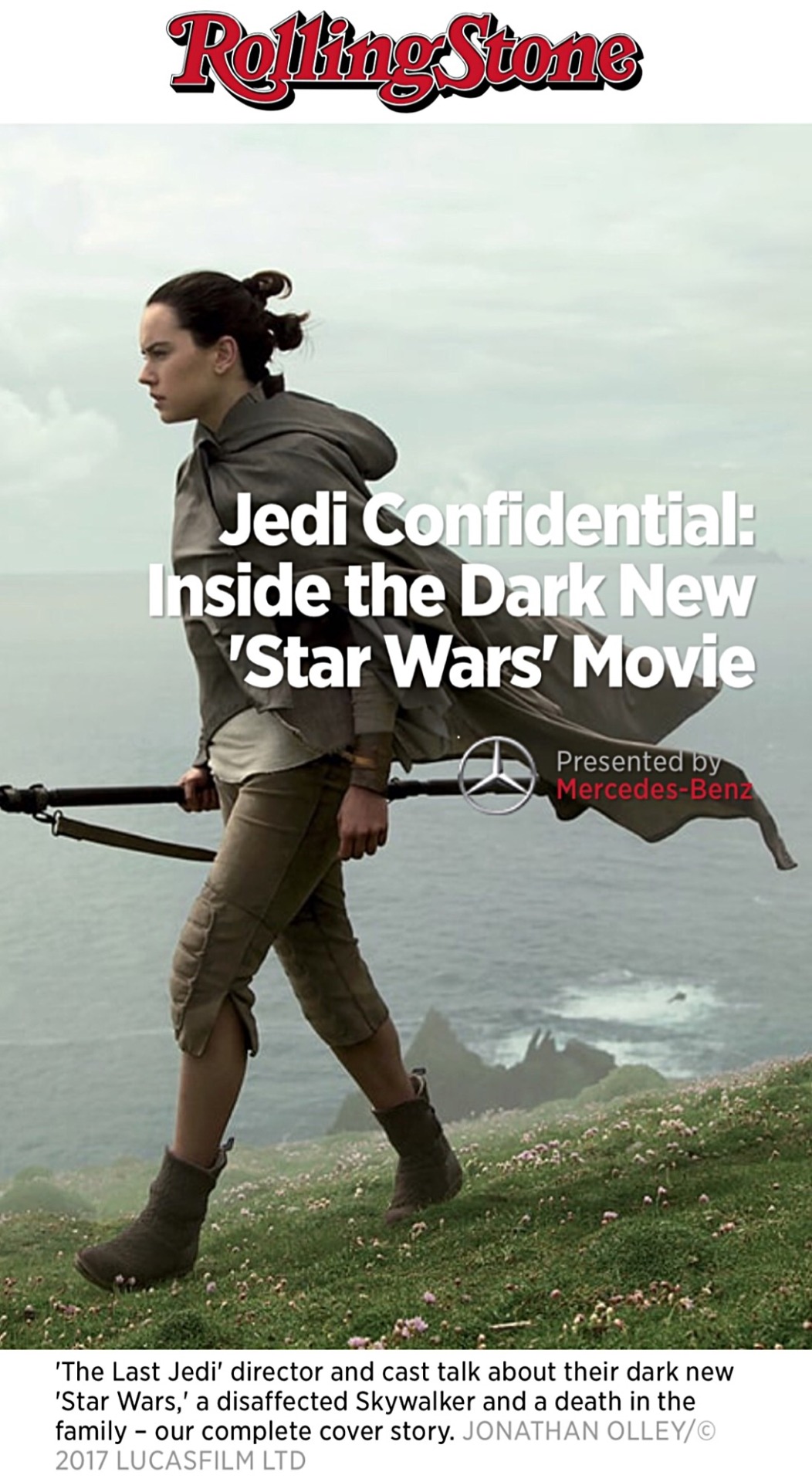
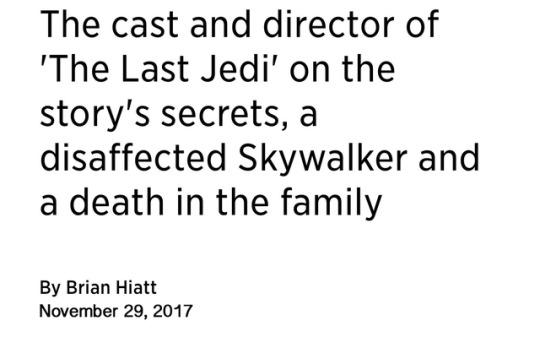
A long time ago, a grade-schooler got his hands on a spaceship. He followed the assembly instructions as best he could, snapping on the cannons, the landing gear, the tiny interstellar-chess table. Soon enough, Rian Johnson was holding his very own Millennium Falcon. “The first thing I did,” he recalls, “was throw it across the room, to see how it would look flying.” He grins. “And it broke.”
Johnson grew up, went to film school, made some good stuff, including the entertainingly twisted 2012 sci-fi drama Looper. He’s nearly 44 now, though his cherub cheeks and gentle manner make it easy to picture the kid he was (too easy, maybe – he’s trying to grow back a goatee he shaved); even his neatly pressed short-sleeve button-down has a picture-day feel. In late October, he’s sitting in an office suite inside Disney’s Burbank studios that he’s called home for many months, where a whiteboard declares, “We’re working on Star Wars: The Last Jedi (in case you forgot).” Johnson is the film’s writer-director, which means he ended up with the world’s finest collection of replacement toys, including a life-size Falcon set that nearly brought him to tears when he stepped onto it. He treated it all with what sounds like an intriguing mix of reverence and mischief – cast members keep saying nothing was quite what they expected. “I shook up the box a little bit,” he says, with that same grin.
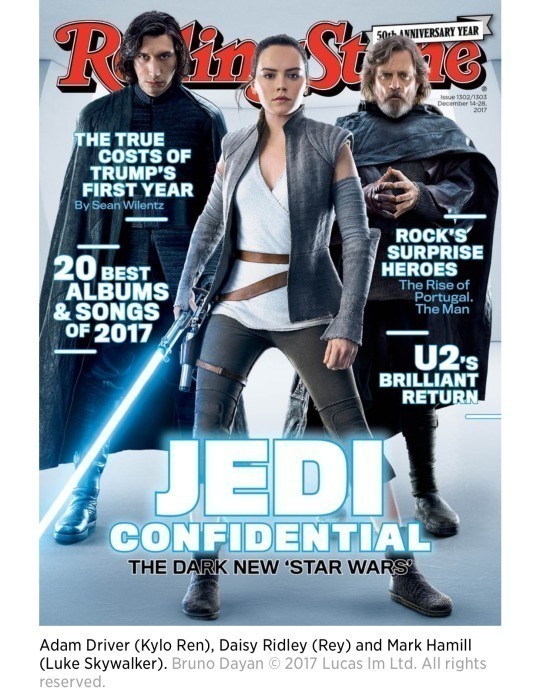
Meanwhile, back in the real world, everything is broken. In the months since the franchise stirred back to life in 2015’s The Force Awakens, it has felt rather like some incautious child grabbed civilization itself and threw it across the room – and, midflight, many of us realized we were the evil Empire all along, complete with a new ruler that even latter-day George Lucas at his most CGI-addled would reject as too grotesque and implausible a character.
Weirdly, the saga saw it all coming – or maybe it’s not so weird when you consider the Vietnam War commentary embedded in Lucas’ original trilogy, or the warnings about democracy’s fragility in his prequels. In the J.J. Abrams-directed The Force Awakens, a revanchist movement calling itself the First Order assembles in Triumph of the Will-style marches, showing the shocking strength of an ideology that was supposed to have been thoroughly defeated long ago. What’s left of the government is collapsing and feckless, so the only hope in sight is a band of good guys known as the Resistance. Familiar, this all sounds.
“It’s somewhat a reflection of society,” acknowledges the saga’s new star, Daisy Ridley, who plays Rey, and who has gone from unknown London actress to full-blown movie star nearly as fast as her character went from desert scavenger to budding Jedi. “But also it is escapism, because there are creatures and there are people running around with fucking lasers and shit. So, I think, a wonderful mix of both.”
And the worse the world gets, the more we need that far-off galaxy, says Gwendoline Christie, who plays stormtrooper honcho Captain Phasma (as well as Game of Thrones’ Brienne of Tarth): “During testing times, there’s nothing wrong with being transported by art. I think we all need it. Many of us are united in our love for this one thing.”
The Last Jedi, due December 15th, is the second episode of the current trilogy, and advance word has suggested that, as in the original middle film, The Empire Strikes Back, things get darker this time. But Johnson pushes back on that, though he does admit some influence from the morally ambiguous 2000s reboot of Battlestar Galactica (which is funny, because Lucas considered the Seventies TV show a rip-off and urged a lawsuit – long since settled – against it). “That’s one thing I hope people will be surprised about with the movie,” Johnson says. “I think it’s very funny. The trailers have been kind of dark – the movie has that, but I also made a real conscious effort for it to be a riot. I want it to have all the things tonally that I associate with Star Wars, which is not just the Wagner of it. It’s also the Flash Gordon.”
As of late October, almost no one has seen it yet, but Johnson seems eerily free of apprehension about its prospects. He exuded a similar calm on set, according to Adam Driver, who plays Han and Leia’s Darth Vader-worshipping prodigal son, Kylo Ren. “If I had that job, I would be stressed out,” he says. “To pick up where someone left off and carry it forward, but also introduce a vocabulary that hasn’t been seen in a Star Wars movie before, is a tall order and really hard to get right. He’s incredibly smart and doesn’t feel the need to let everyone know it.” (“It felt like we were playing the whole time,” says Kelly Marie Tran, cast as the biggest new character, Rose Tico.) A few weeks after we talk, Lucasfilm announces that Johnson signed on to make three more Star Wars films in the coming decade, the first that step outside of the prevailing Skywalker saga, indicating that Disney and Lucasfilm matriarch Kathleen Kennedy are more than delighted with Last Jedi. And Kennedy’s not easily delighted, having recently replaced the directors of a Han Solo spinoff midshoot and removed original Episode 9 director Colin Trevorrow in favor of Abrams’ return.
The Force Awakens’ biggest triumph was the introduction of new characters worth caring about, led by Rey and Kylo Ren, plus the likes of John Boyega’s stormtrooper-defector Finn, Oscar Isaac’s Poe Dameron and more. Kylo Ren (born Ben Solo) lightsaber-shanked Harrison Ford’s Han, depriving Johnson of one coveted action figure – but the film left us with Carrie Fisher’s Princess Leia, now the general who leads the Resistance, and the climactic reveal of Mark Hamill’s now-grizzled Luke Skywalker.
The Last Jedi will be Fisher’s last Star Wars movie. In the waning days of the cruel year of 2016, she went into cardiac arrest on an airplane, dying four days later. Less than a month afterward, 500,000 or so people assembled in Washington, D.C., for that city’s Women’s March, and Leia was everywhere, in posters bearing her doughnut-haired image circa 1977, with accompanying slogans (“A Woman’s Place Is in the Resistance” was, perhaps, the best).
Johnson had grown close with Fisher, and is glad to hear that I visited her psychedelically decorated Beverly Hills house a couple of years back, where she did almost an entire hilarious interview prone in bed. Afterward, she cheerily cracked jokes about drugs and mental illness in front of a visiting Disney publicist. “You got to experience a little bit of that magical sphere that she created,” says Johnson, who went over the script with her in that same bedroom. “I’m happy I got to poke my head into that, briefly, and know her even a little bit.”
He left her part in the film untouched. “We didn’t end up changing a thing,” says Johnson. “Luckily, we had a totally complete performance from her.” So it is now Abrams who has to figure out how to grapple with Fisher and Leia’s sudden absence. (He is characteristically gnomic on the matter: “It’s a sad reality,” he says. “In terms of going forward … time will tell what ends up getting done.”)
Overall, Johnson enjoyed what seems like an almost unfathomable level of autonomy in shaping The Last Jedi’s story. He says no one dictated a single plot point, that he simply decided what happens next. And he’s baffled by fans who are concerned by the idea that they’re “making it up as we go along”: “The truth is, stories are made up! Whether somebody made this whole thing up 10 years ago and put it on a whiteboard and we all have to stick to that, or whether we’re organically finding it as we move forward, it doesn’t mean that any less thought is being put into it.”
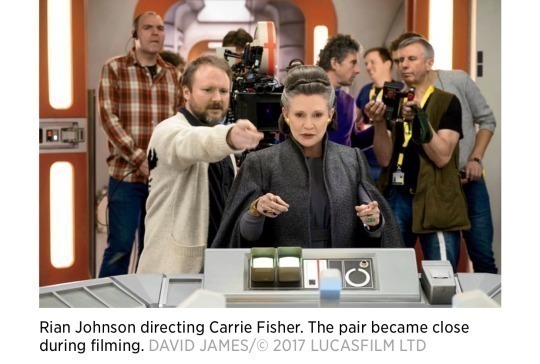
Mark Hamill’s single scene in The Force Awakens lasts all of one minute, and he doesn’t say a thing. But it’s an indelible piece of screen acting with real gravitas, from an underrated performer who had become better known for Broadway and voice-over work – he’s been the definitive animated Joker since the early Nineties. (“With voice-over,” Hamill says, “I thought, ‘This is great! I can let myself go to hell physically! I don’t have to memorize lines!’”) As Rey approaches him on the lonely mountaintop where’s he’s presumably spent years studying the Jedi equivalent of the Talmud, Luke Skywalker’s bearded face cycles through grief, terror and longing.
“I didn’t look at that as ‘Oh, this is going to be my big chance,’” says Hamill, who has just shown up at Johnson’s offices and plopped down next to him, carrying a large thermos of coffee in the right hand that Darth Vader once chopped off. He has a trimmed-down version of his elder-Jedi beard, which he’s grown to appreciate: “I shaved, and I thought, ‘You know what, the beard does cover up the jowl.’”
Hamill is a charming, jittery chatterbox – turns out that even at his youngest and prettiest, he was a geek trapped in the body of a golden boy. He is excitable and wild-eyed enough to give the vague sense that, like Luke, he actually might have spent a few solitary years on a distant planet, and is still readjusting to Earth life, or at least movie stardom.
He admits to having had “frustrations over being over-associated” with Star Wars over the years – his Skywalking cost him a chance at even auditioning to reprise his stage role as Mozart in the film of Amadeus – “but nothing that caused me any deep anguish.” He still spent the decades since Return of the Jedi acting and raising a family with Marilou, his wife of 39 years. And as for his current return to the role of Luke? “It’s a culmination of my career,” he says. “If I focused on how enormous it really is, I don’t think I could function. I told Rian that. I said, as absurd as it sounds, ‘I’m going to have to pretend this is an art-house film that no one is going to see.’ ”
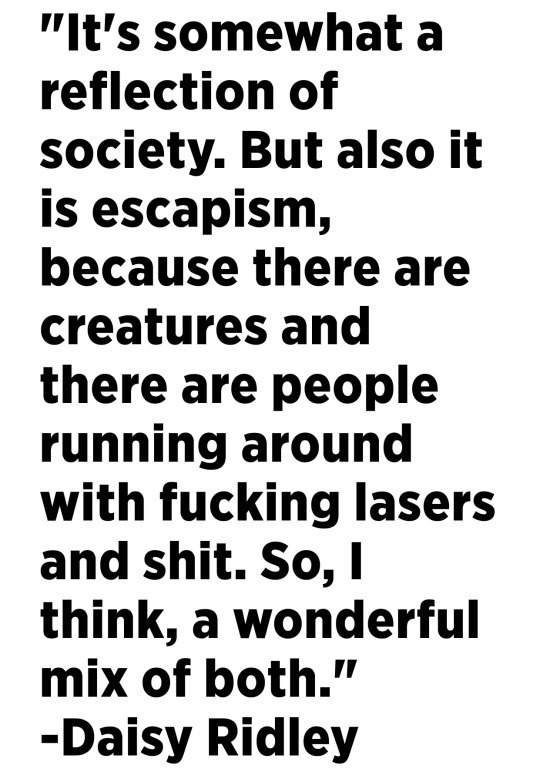
For his Force Awakens scene, he says, “I didn’t know – and I don’t think J.J. really knew – specifically what had happened in those 30 years. Honestly, what I did was try and give J.J. a range of options. Neutral, suspicion, doubt … taking advantage of the fact that it’s all thoughts. I love watching silent films. Think of how effective they could be without dialogue.”
Abrams had some trepidation over the idea of handing Hamill a script with such a tiny role. “The last thing I wanted to do was insult a childhood hero,” he says, “but I also knew it was potentially one of the great drumrolls of all time.” In fact, Hamill’s first reaction was, “What a rip-off, I don’t get to run around the Death Star bumping heads with Carrie and Harrison anymore!”
But he came to agree with Abrams, especially after he counted the number of times Luke was mentioned in the screenplay – he thinks it was more than 50: “I don’t want to say, ‘That’s the greatest entrance in cinematic history’ … but certainly the greatest entrance of my career.”
Johnson turns to Hamill. “Did I ever tell you that early on when I was trying to figure out the story for this,” he says, “I had a brief idea I was chasing where I was like, ‘What if Luke is blind? What if he’s, like, the blind samurai?’ But we didn’t do it. You’re welcome. Didn’t stick.” (He adds that this was before a blind Force-using character showed up in 2016’s side film Rogue One.)

Hamill laughs, briefly contemplating how tough that twist would’ve been: “Luke, not too close to the cliff!”
He had a hard enough time with the storyline Johnson actually created for Luke, who is now what the actor calls a “disillusioned” Jedi. “This is not a joyful story to tell,” Hamill says, “my portion of it.” Johnson confirms that Hamill flat-out told him at the start that he disagreed with the direction Luke’s character was taking. “We then started a conversation,” says Johnson. “We went back and forth, and after having to explain my version, I adjusted it. And I had to justify it to myself, and that ended up being incredibly useful. I felt very close to Mark by the end. Those early days of butting heads and then coming together, that process always brings you closer.”
Hamill pushed himself to imagine how Luke could’ve gotten to his place of alienation. A rock fan who’s buddies with the Kinks’ Dave Davies, Hamill started thinking about shattered hippie dreams as he watched a Beatles documentary. “I was hearing Ringo talk about ‘Well, in those days, it was peace and love.’ And how it was a movement that largely didn’t work. I thought about that. Back in the day, I thought, by the time we get into power, there will be no more wars. Pot will be legal.” He smiles at that part. “I believed all that. I had to use that feeling of failure to relate to it.” (We do already know that Luke was training a bunch of Jedi, and Kylo Ren turned on him.)
Hamill’s grief over the loss of Fisher is still fresh, especially since the two of them got to renew their bond, and their space-sibling squabbling, after fallow decades that had given them far fewer reasons to get together. “There was now a comfort level that she had with me,” he says, “that I wasn’t out to get anything or trying to hustle her in any way. I was the same person that I was when she knew me. … I was sort of the square, stick-in-the-mud brother, and she was the wild, madcap Auntie Mame.” Promoting the movie is bringing it all back for him. “I just can’t stand it,” he says. “She’s wonderful in the movie. But it adds a layer of melancholy we don’t deserve. I’d love the emotions to come from the story, not from real life.”
I mention how hard Luke seems to have had it: never meeting his mom; finding the burnt corpses of the aunt and uncle who raised him; those well-known daddy issues; the later years of isolation. “It’s the life of a hero, man,” says Johnson. “That’s what you’ve gotta do to be a hero. You’ve gotta watch people that you love burn to death!”
Hamill notes that reality is not so great either. “Sometimes,” he says, softer than usual, “you think, ‘I’d rather have Luke’s life than mine.’”

Adam Driver has a question for me. “What,” he asks, “is emo?”
Between training for the Marines and training at Juilliard to become one of his generation’s most extraordinary actors, Driver missed some stuff, including entire music genres. But the rest of the world (including an amusing parody Twitter account) decided there’s something distinctly emo about his character, with his luxuriant hair, black outfits and periodic temper tantrums. “You have someone who’s being told that he’s special his whole life,” Driver says of his character, “and he can feel it. And he feels everything probably more intensely than the people around him, you know?”
As anyone who’s seen Driver in practically anything, even Girls, could tell you, the actor himself seems to feel things more strongly than most. “I don’t think of myself as a particularly intense person,” he says, possibly not unaware that he is making intense eye contact, and that his right knee is bouncing up and down with excess energy. “I get obsessive about certain things and, like, enjoy the process of working on something.” He’s in a Brooklyn cafe, on a tree-lined street, that seems to be his go-to spot for interviews. He arrived early, fresh from shooting the new Spike Lee movie, wearing a dark-blue sweater over black jeans and high-top Adidas. Driver has a certainty to him, a steel core, that’s a little intimidating, despite his obvious affability and big, near-constant laugh. It’s not unlike talking to Harrison Ford, who played his dad. Until Driver’s character murdered him.
Driver, raised by his mom and preacher stepdad after his parents divorced when he was seven, doesn’t flinch when I suggest his own father issues might be at work. “I don’t know that it’s always that literal,” he says. He mentions that Kylo Ren also murders Max Van Sydow’s character, who was sort of a “distant uncle” to him. “No one asks me, ‘So you have a distant-uncle problem?’ ”
John Boyega told me in 2015 that Driver stayed in character on set, but that seems to be not quite true. Driver just tries to keep focused on his character’s emotions in the face of an environment he can’t help but find ridiculous. “Watching Star Wars, it’s an action-adventure,” he says. “But shooting it, it’s a straight comedy. Stormtroopers trying to find a bathroom. People dressed as trolls, like, running into doorways. It’s hilarious.” And when he wears his helmet, he can’t see very well. “You’re supposed to be very stealth, and a tree root takes you down.”

He refuses to see his character as bratty. “There is a little bit of an elitist, royalty thing going on,” he says, reminding us that the character’s estranged mom is “the princess. I think he’s aware of maybe the privilege.” He does acknowledge playing Kylo Ren younger than his own age of 34: “I don’t want to say how much younger, 'cause people will read into it… .” He flushes, and later says he regrets mentioning it at all. If it’s a plot spoiler, it’s unclear exactly how, unless it’s related to his unexplained connection to Rey. The two apparently spend serious time together in this film. “The relationship between Kylo and Rey is awesome,” says Ridley, whom Driver calls a “great scene partner,” apparently one of his highest compliments.
At first, Driver wasn’t totally sure he wanted to be in a Star Wars movie. I’m always skeptical of Hollywood movies because they’re mostly just too broad,“ he says. But Abrams’ pitch, emphasizing the uniqueness of Kylo Ren’s character as a conflicted villain, made the sale. “Everything about him from the outside is designed to project the image that he’s assured,” he says. Only in private can he acknowledge “how un-figured-out he is … how weak.”
Driver can make a passionate case for why Kylo Ren isn’t actually a villain at all.
“It’s not like people weren’t living on the Death Star,” he says, his brown eyes shifting from puppyish to fierce without warning. He seems almost in character now. “Isn’t that also an act of terrorism against the hundreds of thousands of people who died there? Did they not have families? I see how people can point to examples that make themselves feel they’re right. And when you feel in your bones that you’re supported by a higher power on top of that, and you’re morally right, there’s no limit to what you’ll do to make sure that you win. Both sides feel this way.”
You’re starting to talk me into joining the Empire, I say. He laughs and shifts his delivery one degree over the top. “So, the rebels are bad,” he says, connecting his fist with the table. “I strongly believe this!”
On an extravagantly rainy Thursday evening in Montreal, I’m sitting at crowded, noisy Le Vin Papillon, a wine bar ranked as Canada’s fourth-best restaurant, holding a seat for a Jedi. Ridley arrives right on time, in a fuzzy faux-fur coat and a jumper dress – “the dregs of my wardrobe,” she says. Her shortish hair is in a Rey-ish topknot that makes her way too recognizable, but she doesn’t care. “This is how I have always had my hair,” says Ridley. “I am not going to change it.” She’s been in Montreal for three months, shooting a Doug Liman-directed sci-fi movie called Chaos Walking – which “is a little bit chaotic, in that we’re writing as we go and everything,” she says. “I’ve realized I don’t work well with that.”
She’s on the second of two unexpected days off thanks to co-star Tom Holland (a.k.a the latest Spider-Man) suffering an impacted wisdom tooth, but she’s still deeply exhausted.
“I need a [vitamin] B shot in my ass,” she muses, in the kind of upscale British accent that makes curses sound elegant. It seems already clear that typecasting won’t pose the kind of problem for her that it did for the likes of Hamill and Fisher. Instead, she’s just busy in a way that only a freshly minted 25-year-old movie star could be – and she still managed to fulfill a pre-fame plan to go back to college for a semester last year. “I have no control in my life at all,” she says. She has four movies on the way, not even counting the Liman one. “So there is a lot going on, and I have never had to deal with that before. I don’t think my brain can really keep up with what is going on.” She has full-blown night terrors: “I wake up and scream.”
Rey had an epochal moment in the last movie, claiming her lightsaber from the snowy ground, and with it, her power, her destiny, her place at the center of the narrative. Her turn. Ridley is still absorbing what that moment, and that character, mean to women and little girls. But she definitely felt more pressure this time around, especially because last time, “it was all so insane, it felt like a dream,” she says. “I remember saying to Rian, 'I am so fucking neurotic on this one.’ I was like, 'I am going to fuck this up. All these people think this thing. How do I do that thing?’ ”
Part of the problem may have been Ridley’s tendency to downplay what she pulled off in the first movie. Her heart-tugging solo scenes in the first act, especially the moment where she eats her sad little “one half portion” of green space bread, created enormous goodwill, in seconds, for a character no one had seen before. She mentions Harrison Ford’s effusive praise for that eating scene, to the point where he was “getting emotional.” “I don’t know,” she says with a shrug, ultimately giving credit for the impact to Abrams and the movie’s cinematographer, Dan Mindel. “I was just eating!”
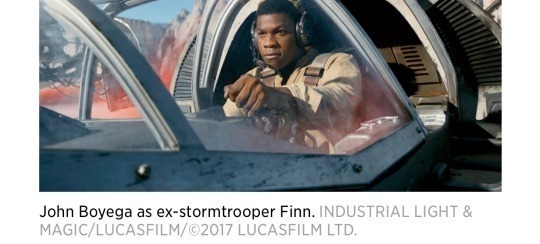
But in other ways, Rey has given her confidence. On her current film, she says, she was offered a stunt double for a scene where a door would swing open and knock her back. She took Liman aside and said, “'Doug, I don’t need a stunt double to do that.’ And I thought, 'I don’t know if this would’ve happened if it was Tom Holland.’”
Unlike almost everyone else in the world, Ridley has known for years who Rey’s parents are, since Abrams told her on the set of The Force Awakens. Ridley believes that nothing ever changed: “I thought what I was told in the beginning is what it is.” Which is odd, because Johnson insists he had free rein to come up with any answer he wanted to the question. “I wasn’t given any directive as to what that had to be,” he says. “I was never given the information that she is this or she is that.”
The idea that Johnson and Abrams somehow landed on the same answer does seem to suggest that Rey’s parents aren’t some random, never-before-seen characters. All that said, Abrams cryptically hints there may have been more coordination between him and Johnson than the latter director has let on, so who knows what’s going on here – they may be messing with us to preserve one of Abrams’ precious mystery boxes. In any case, Ridley loves the speculation: Her favorite fan theories involve immaculate conception and time travel. It seems more likely that she’s either Luke’s daughter or his niece, but again, who knows.
Back in 2015, Ridley told me she was fine with the idea of being seen as Rey forever, the way Fisher was always Leia. Now she’s changed her mind. “There are literally no similarities with Carrie’s story and mine,” she says, adding that while Fisher ultimately embraced writing over acting, she plans on continuing to “inhabit” as many characters as possible. On the other hand, “a lot of Rey is me,” she says, “but that is not me being Rey. That is parts of me being a character as Rey, because how could it not? So in that sense, I understand it, because so much of Leia is Carrie.”
This trilogy will end with Abrams’ Last Jedi sequel, and after that, it sounds like the main thrust of the franchise will move into Johnson’s mysterious new movies, which look to be unconnected to the previous saga. As far as Abrams is concerned, that will be the end of the Skywalker story. “I do see it that way,” he says. “But the future is in flux.”
As far as Ridley is concerned, the future of Rey is pretty much set. She doesn’t want to play the character after the next movie. “No,” she says flatly. “For me, I didn’t really know what I was signing on to. I hadn’t read the script, but from what I could tell, it was really nice people involved, so I was just like, 'Awesome.’ Now I think I am even luckier than I knew then, to be part of something that feels so like coming home now.”
But, um, doesn’t that sort of sound like a yes? “No,” she says again, smiling a little. “No, no, no. I am really, really excited to do the third thing and round it out, because ultimately, what I was signing on to was three films. So in my head, it’s three films. I think it will feel like the right time to round it out.”
And how about coming back in 30 years, as her predecessors did? She considers this soberly, between bites of Brussels sprouts roasted on the stalk. (We split the dish, which means she got … one half portion.) “Who knows? I honestly feel like the world may end in the next 30 years, so, if in 30 years we are not living underground in a series of interconnected cells … then sure. Maybe. But again, it’s like, who knows. Because the thing I thought was so amazing, was people really wanted it. And it was done by people who really love it.”
She thinks even harder about it, this new Star Wars trilogy that we’ve made up on the spot. “How old will I be?” she asks, before doing the math. “55.” She looks very young for a moment, as she tries to picture herself as a middle-aged Jedi. Then she gives up. It’s time to go, anyway; she has a 5:25 a.m. pickup tomorrow for her new movie. “Fuck,” Ridley says. “I can’t think that far ahead.”
###
#oscar isaac#poe dameron#star wars#the last jedi#rolling stone#rian johnson#mark hamill#luke skywalker#adam driver#kylo ren#daisy ridley#rey#john boyega#finn#carrie fisher#general leia#jj abrams
57 notes
·
View notes
Text
Spring 2017 Anime Season
Here’s what I’m watching:
Fukumenkei Noise is one of my favorites this season. We need more shoujo romances like this, with cool, stylish art and awesome music and heroines who actually, you know, do stuff besides pine after guys (and to be clear, the heroine here does pine after a guy, but it’s definitely not the only thing she does, and she’s a refreshingly proactive heroine). The love triangle is particularly interesting because both male love interests seem to have an equal shot at ending up with heroine Nino. My favorite is Yuzu, and his attempts to support Nino and her crush on Momo while also being in love with her himself, and his conflicted feelings between wanting her to be happy and wanting her love for Momo to fail, are the highlights of the series. There’s also the “secretly in an alternative rock band” angle, which provides for some great costume changes and even better songs. Overall, it’s one of the better shoujo anime of the past few seasons.
Royal Tutor Haine is a cute and quirky little comedy about a no nonsense tutor called in to teach four difficult princes how to best prepare to be king (in the event their older brother dies or something, I guess). The charm really comes from the tutor himself, Haine. He looks like he’s twelve, but he’s actually a full-grown adult with appropriately adult-like voice and mannerisms. We see this often with female characters (to justify sexualizing characters that look like little girls, usually) but it’s a bit more uncommon to see it like this. His genuine affection for the princes while remaining somewhat stern in his teachings is surprisingly sweet to watch. The princes themselves are a collection of bishounen stereotypes (the tsundere who’s secretly shy and insecure, the formal and stiff one in glasses, the strong, rough one who’s actually a big softie, and the flamboyant one always surrounded by ladies). I wish they had been as interesting as Haine, but they are at least cute and fun, even as they march down very familiar character arcs. The character designs are, of course, very beautiful (even the castle guards are good looking!) and the music is fine (I can take or leave the opening theme, but the ending theme is extremely catchy - especially in the alternate version with the boy band performing the song in full cosplay of the characters).
Kenka Banchou Otome is a cute little otome series with a silly premise that benefits from the short episode runtime (the episodes usually run under eight minutes each). This effectively trims out all the fat and leaves us with a strong focus on what makes the series fun: attractive male characters getting their asses handed to them by a cute, pink haired heroine who happens to be a badass martial artist (and is posing as a guy), and then said male characters falling for her (or him, from their perspective, I guess). The heroine is great because she’s kind and sweet but she will still mess these guys up if they attack or challenge her. I also have a soft spot for the guy she traded places with, who is supposed to be a rough and tough delinquent but is all too happy to put on a skirt and pose as the heroine at her all girls school (and he has a room full of posters of a certain hot male idol...). This series is basically short, quick bursts of fun.
Tsuki ga Kirei is a sweet, subtle romance that, refreshingly. spends equal time from the perspectives of both parties in the romance. I was a little iffy on the show at first, because it was slow-burning and, if I’m being totally honest, a bit boring. Both leads are so shy and quiet that it’s literally frustrating to watch them in the beginning. You’ll find yourself wanting to scream, “Somebody say something for God’s sake!” But their collective insecurities also make them painfully relatable at times. We’ve all had those awkward moments where we have no idea what to say or, worse, say the wrong thing and have no idea how to fix it. As the episodes roll by, you find yourself rooting for this cute young couple. The art has a somewhat subdued style, with lots of natural colors (hilariously, a side character is the only person with strange-colored hair, which is a fun inverse of the usual trope). Speaking of the side characters, they’re fairly interesting and get some much needed development in the brief, after credits skits that are actually really funny (which is odd since the main story has little humor). I was a little put off by the fact that, despite the characters being in middle school, it’s heavily implied that a side couple is sexually active and it’s also implied that their teacher is in love with one of her students. These aspects are mostly left to the aforementioned skits and are used for comedy, but I found them just a little bit disturbing. Overall, the show is worth a watch if you don’t mind a lot of quiet reflection in your gentle romance anime.
Rage of Bahamut: Virgin Soul is the second season of Rage of Bahamut and it’s one of the shows I’m enjoying most this season. I enjoyed season one quite a lot, but season two has been much better, with an awesome new heroine in Nina, a cute and silly young girl who is super strong, falls in love with every handsome guy who walks into her line of sight, and oh yeah, turns into a giant, fire-breathing dragon. Like in the first season, the show does an excellent job of balancing the humorous nature of its lead characters against the dark and violent world they live in. There are some truly horrific things going on, as the world is wrapped up in a three-way conflict between demons, gods, and the humans who are using a new sort of magic (or technology?) to reign supreme. It’s also interesting that one of the main antagonists from season one (Azazel) is now one of the main protagonists (second only to Nina), and even though I didn’t like him much before (and he’s still not a very nice person at all), the story paints his situation in a such a sympathetic light that I’m rooting for him. The animation, design work, and music are all amazing (go watch the stylish black, white, and red opening theme - you won’t regret it).
Kabukibu is another quirky show, this time about a high schooler starting his own Kabuki club and putting on amateur Kabuki performances. I don’t know anything about Kabuki besides the brief mentions I’ve seen of it in anime, so this was pretty interesting for me. The series follows familiar beats to other “characters trying to start a club so they have to recruit people” stories, complete with characters who continually refuse to join but you know they’re going to end up joining anyway. Despite this, the show is fun and very informative. It makes me want to watch an actual Kabuki play. I also like that the main character isn’t the star of the club. He can’t act to save his life. He plays a behind-the-scenes role (he writes scripts, helps with sound effects and staging, etc.). This was a nice twist on the usual formula. My only real gripe with the show is the fact that a particular female character is consistently referred to as fat or “round” by the other characters as well as herself, yet she looks just as skinny as the rest of the girls in the show. It’s just bizarre, to be honest. Another character does privately think that she’s “not as fat as she thinks”, but that still implies she’s some degree of fat and none of the other characters seem to share this sentiment. It’s basically another example of animators being so adverse to drawing fat girls that they just said “screw it" and drew another thin girl. Still, it’s a rather minor complaint in an otherwise fun show.
Quan Zhi Gao Shou (I hope I spelled that right) is a Chinese series that’s been making waves lately for two primary reasons: It draws a lot of comparisons to Sword Art Online (both feature a player with God-like gaming skills playing an MMO that seems way too important) and secondly, it’s one of the best looking animated tv series I’ve seen from any country, in a very long time. This is significant because pretty much all of the Chinese shows I’ve watched over the past few seasons have had noticeably lower animation quality than your average Japanese anime. Quan Zhi, however, is gorgeous. Everything from the backgrounds to the character models looks fantastic. So what about those SAO comparisons? It’d be easy to write off Quan Zhi as boring, because, at first glance, it’s nowhere near as exciting as SAO. No one is trapped in the game. Whatever happens in the game has no direct physical effect on the players, and even though action scenes in the game are animated as if the players are directly in the game world, it’s made clear that the players are simply sitting at computers and all the dialogue we’re hearing is either voice or text chatting in-game. It’s not even virtual reality! But depending on your age bracket, you might find the first episode of Quan Zhi to be far scarier than the first episode of SAO. This is because there are definitely high stakes for these players, even if their physical bodies are not at risk. What they could very possibly lose are their sponsorship deals and team positions, and losing those means losing their income and livelihood. The first episode is frightening for the adults in the audience, because suddenly losing your only source of income is TERRIFYING. Believe me, I know this very well. The way the series ties itself to themes of job security and economics gives it an air of realism that’s been sorely lacking in gaming-based anime lately. High on my watch list.
Shingeki no Kyojin Season Two has been great. Everyone can say what they want about SnK being “too mainstream” or whatever but the fact is it’s a quality show and it’s brought in a lot of new anime fans. There’s usually a reason a series becomes massively popular, and in this case, it’s beautiful animation, great music, and a tightly plotted story that doesn’t always follow familiar action anime beats. Combine that with a general lack of tired romantic subplots and the fact that the show doesn’t distinguish any difference of strength between genders (if anything, it’s the ladies who are the strongest), and you have a show devoid of most of the stuff people complain about when it comes to anime. The show is not perfect, of course. Some scenes can drag on a little too long and occasionally characters do things in service of the plot that defy logic. But these are rare enough to not be a problem. I was tempted to say I’m enjoying season two more than season one (because I am enjoying it a LOT), but it’s been so long that I honestly can’t remember exactly how I felt while watching the first season. I just know it was one of my favorites in a season full of great shows. If you’re one of those people who are avoiding SnK because it’s “too popular”, you need to reevaluate why you do or do not watch a series.
Boku no Hero Academia Season Two continues to be enjoyable. This is because the series has enough charm to distract me from my issues with it (namely, that it’s faithfully marching down the standard shounen fighting anime path with practically no deviations - the show is basically Naruto with super heroes instead of ninjas and with slightly less angst). The best thing about the show by far is the protagonist Midoriya. He’s just a genuinely nice person that you’ll relate to and root for. Another highlight is his relationship with his mentor, All-Might. It’s just such a sweet, positive relationship, and it’s nice to see that there’s pretty much zero negativity here (I don’t even remembering seeing any good natured ribbing). All-Might takes a very fatherly role here (to the point that another character suspects Midoriya of being All-Might’s secret love child!), which works well for the fatherless Midoriya. In fact, there’s a general sense of positivity permeating the whole show. This is because all of the main characters, regardless of their general attitudes and behaviors, want to be heroes so they can help people. I would also commend the show for it’s variety in character designs, IF that variety extended to its female characters. Seriously, look at all the crazy or weird looking male characters, many of which don’t even look human, then look at the lady characters, all of which, without exception, are human-shaped (and they’re pretty much all the same human shape: large breasts, narrow waist, and curvy thighs). There’s only one that looks the slightest bit strange, and it’s only because of her unique coloring. It’s just a little irritating that even in a show filled with guys with literal crow heads or multiple arms and come in tons of different shapes and sizes, all the ladies are in the default “conventionally attractive” shape. Still yet, the show is a lot of fun and definitely worth watching.
Gin no Guardian is another Chinese series, albeit one that doesn’t look anywhere near as polished as Quan Zhi Gao Shou. The episodes run at around twelve minutes each, which is more common for Chinese shows. Ironically, it actually lends itself much more to SAO comparisons than Quan Zhi does, as it features an online game that characters actually go into and can presumably be hurt or possibly killed in (it’s never specifically said that but it seems to be implied, or at the very least, there are real world consequences for things that happen in the game). The first few episodes were very good, focusing on a couple who come from vastly different backgrounds (a rich heiress and a poor boy doing menial tasks on the school grounds to cover his tuition) playing a game together and connecting in that virtual world in a way they never could in reality. It was actually very well done, and a few scenes tugged on my heartstrings. But then we get a predictable plot twist that effectively shuts down that whole dynamic and turns the show into a more generic action anime with MMO elements. The show is still okay but I have to admit I’ve found myself zoning out while watching the more recent episodes.
Uchouten Kazoku Season Two is, like the first season, a unique and quirky little show full of charm. The show does a great job of developing its own world with its own rules and its own version of reality, to such a degree that even the strangest things seem normal and commonplace here. You won’t question seeing a frog playing shogi, or the most powerful being in the series methodically ironing all his shirts on the roof of a building. And all the strange things aren’t done just for the sake of being strange. There’s nothing pretentious about this show. Everything is presented with an air of gentle amusement. And even though the show has rare moments of violence and death (and they’re also presented in a natural manner - not at all for shock value or to milk some melodrama from the story), the series is overall positive and good natured. It’s helped by the interesting art style, a somewhat cartoonish design combined with rich colors and gorgeous backgrounds. The animation quality isn’t always perfect, but the overall look of the show makes up for any stumbles. And then there’s Benten, hands-down one of the best female characters to come along in years (if a figure of her existed I would buy it in an instant). Beautiful, supremely powerful, and utterly fearless, Benten is a somewhat neutral force in the story (she both helps and hurts the protagonists, at various points), and her only real goal seems to be seeking amusement. This means sometimes she’s flying around the world (literally flying, as she convinced a Tengu to give her his power) and sometimes she’s going down to hell to wrestle Oni for fun. Because why not? I would watch this show for Benten alone, but fortunately, it’s a great series even without her.
Kyoukai no Rinne Season Three is fun and all, because the world of the series and the setup are fun, but so far it seems to be limiting itself to short, one-shot stories (three per episode), which means there’s no overarching plot for this season. One or two episodes like this would have been fine, welcomed even, as they flesh out various characters are are genuinely entertaining for the most part. But several episodes? In a row? And no end in sight? I know the series has a relaxed pace, and I’ve enjoyed that aspect of it, but this is getting a little too relaxed. I really want the series to go back to actual story arcs, or even full-episode stand alone stories, since they at least have a little more development. There’s an important arc that should be coming up soon, as a new character involved in it is seen in the new opening theme, and it’s one I’m looking forward to a lot so it’s a little frustrating every week when I’m met with yet another collection of mini stories. Oh well. Like I said, the show is still fun and entertaining. It could just be a lot better.
4 notes
·
View notes
Text
Pop Culture Cannibalism

One of the fondest memories of my childhood is a simple one. It’s not a surprise trip to Disneyland, or my first kiss, or the unboxing of a brand new video game console at Christmas. No, in fact, it’s more banal than almost anything you could ever imagine. In reality, one of the most saccharine and amber-coated memories of my pre-teens involved sitting in my family’s living room with my best friend on a lazy summer day watching VH1’s I Love The… Series. We sat there lethargically sprawled out on my family’s couch, pacified by the television as we killed an entire bag of those cheap grocery store fudge pops and gleefully watched early 2000’s actors, comedians, and musicians warmly reflect on the pop culture events of yesteryear.
It feels like such a small thing. It wasn’t a “big” event, there was no defining moment, and if you asked me, I probably couldn’t even remember which season of the show we were watching at the time. If you asked my friend, he probably wouldn’t even remember this happening in the first place. It’s lost to time, one of the dozens of other nameless summer days that we all happily wasted enjoying our reprieve from of middle school.
I remember this day because I remember the feeling. I remember appreciating it in the moment, and it’s something I think of often, especially during the summer. I spent the rest of that summer playing video games, running around with friends, and watching as much as of the “I Love The” series possibly could. Luckily my family had just set up our first DVR, so I was able to methodically record every episode of each season and watch them all sequentially.
It felt good. Actually, it felt incredible. It was like a self-imposed history lesson. I felt like I was doing homework that I actually enjoyed. In my mind, I this show was a comprehensive look at every year of pop culture before I was born. It was the first time I was ever “pop culture woke,” and I realized that a lot of important stuff happened before I was born. I made it my duty to study it. This was my first step toward becoming a pop culture historian.
A couple years later in 2008, I listened to my first podcast. That’s a topic deserving of its own post somewhere down the line (it’s something I’ve been working up to for years). But in 2011 that podcast spun-off into its own show and subsequent network: Laser Time. Laser Time is a topic-based podcast that covers the hyper-specific happenings of our pop-cultural landscape. The show has covered everything from bad Beatles covers, and dirty Christmas songs to surprisingly pervasive concepts like 80’s rap commercials and celebrity vanity projects. The network is also home to a comic book show, a video game podcast, a chronological exploration of The Simpsons, and much more.
Amongst the days and days worth of programming on the Laser Time Network, there is a slightly higher-concept show titled Thirty Twenty Ten. Thirty Twenty Ten is a “pop culture time machine” podcast that looks back at the music, movies, TV, and video games of this exact week 30, 20, and 10 years ago. It’s a blast to listen to, and it just recently clicked that I love this podcast for the same reason that I watched I Love The… series as a kid: it’s a fast-paced, unrelenting, and (relatively) comprehensive look back at our own pop culture history. It’s a carnivorous approach to media, one that doesn’t discriminate, and talks about these bits of the past with an absurd amount of reverence… well, as much reverence as you can have with a fart joke every episode.
I mean what other show would take the time to describe the beauty of the 1986 Transformers movie with an earnest and loving 30-minute discussion? And speaking of earnest, what podcast would care to break down the surprisingly-complicated history of Ernest P. Worrell? Hell, what other piece of media would jump from Predator, OK Computer, Fantastic Four: Rise of the Silver Surfer, and the finale of The Sopranos all within in the same episode?
Thirty Twenty Ten is a blitz of pop culture past. Like a train whizzing by at 50 miles an hour where each compartment is a great forgotten album or hilariously-shitty TV movie. The conflux of the host’s knowledge and anecdotes from the audience (like yours truly) combines into a beautiful listening experience that’s unlike anything else out on the digital airwaves right now.
When I sat down to start writing this it was a warm sunny summer afternoon that brought to mind that one day I spent with my friend watching low-budget VH1 programming. Now as the sun sets over the trees I’m grateful that I have a new weekly fix that emulates the same experience, improves upon it, and gives me a 90-minute trip down memory lane every week.
It’s a pop culture geek's dream.
We’re blessed to live in a world where we can find anything we want in an instant. From childhood recipes to old commercials, to half-remembered lyrics of some distant song. The thing is, most of us don’t take advantage of that resource because these memories aren’t on the forefront of our consciousness. Both I Love The… and Thirty Twenty Ten are great because they capitalize on this information in a way that nobody else is. They’re diving into the rich mine of our shared cultural touch points, and emerging with something from the listener’s own memory. Something that reflects who we are.
Over a decade ago VH1 programmed me to be an absolute dork of a pop culture sponge. Someone who collects, categorizes, and memorizes obsessively. Someone who values the history of art both high and low. It changed my life and made me into the person I am today.
And now Thirty Twenty Ten is reinforcing that. Giving me weekly satiation for my pop cultural hunger. And as my life becomes busier and busier, I can’t be that kid anymore. I can no longer be that middle schooler who spends an entire summer day sitting on his couch downing half a bag of fudgsicles. And as I’ve felt my post-college life whirring into place over the past year I’m grateful to have something like Thirty Twenty Ten there for me when I’m too busy or too tired to do it myself. It’s an absolute joy to have this program and its hosts in my life, and I hope that they continue the show until its logical conclusion. Podcasts have changed my life, and Thirty Twenty Ten is proof that this is all worth it.
#thirty twenty ten#podcast#i love the#vh1#pop culture#time machine#laser time#simpsons#comic books#video games#art
0 notes